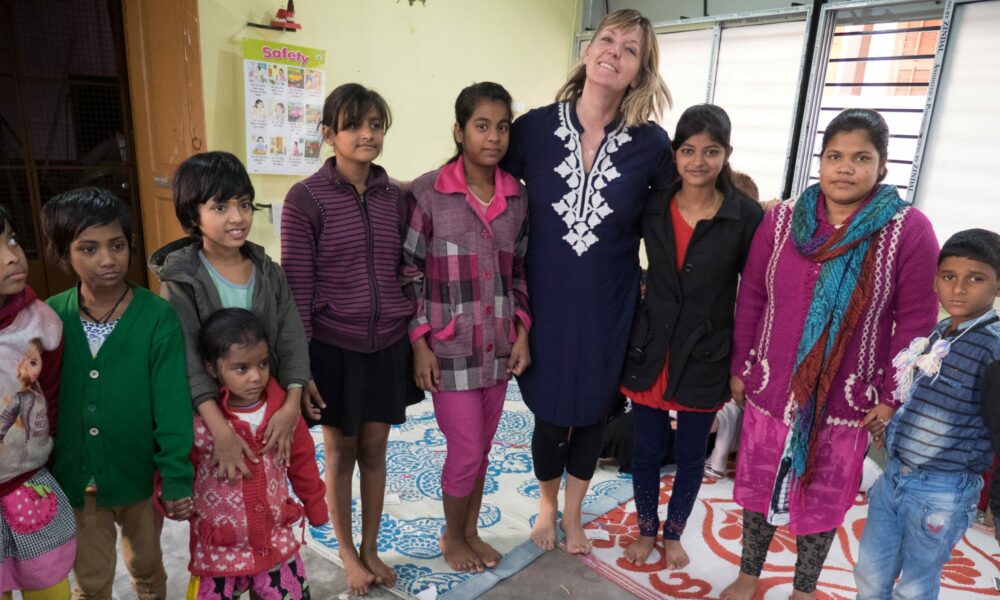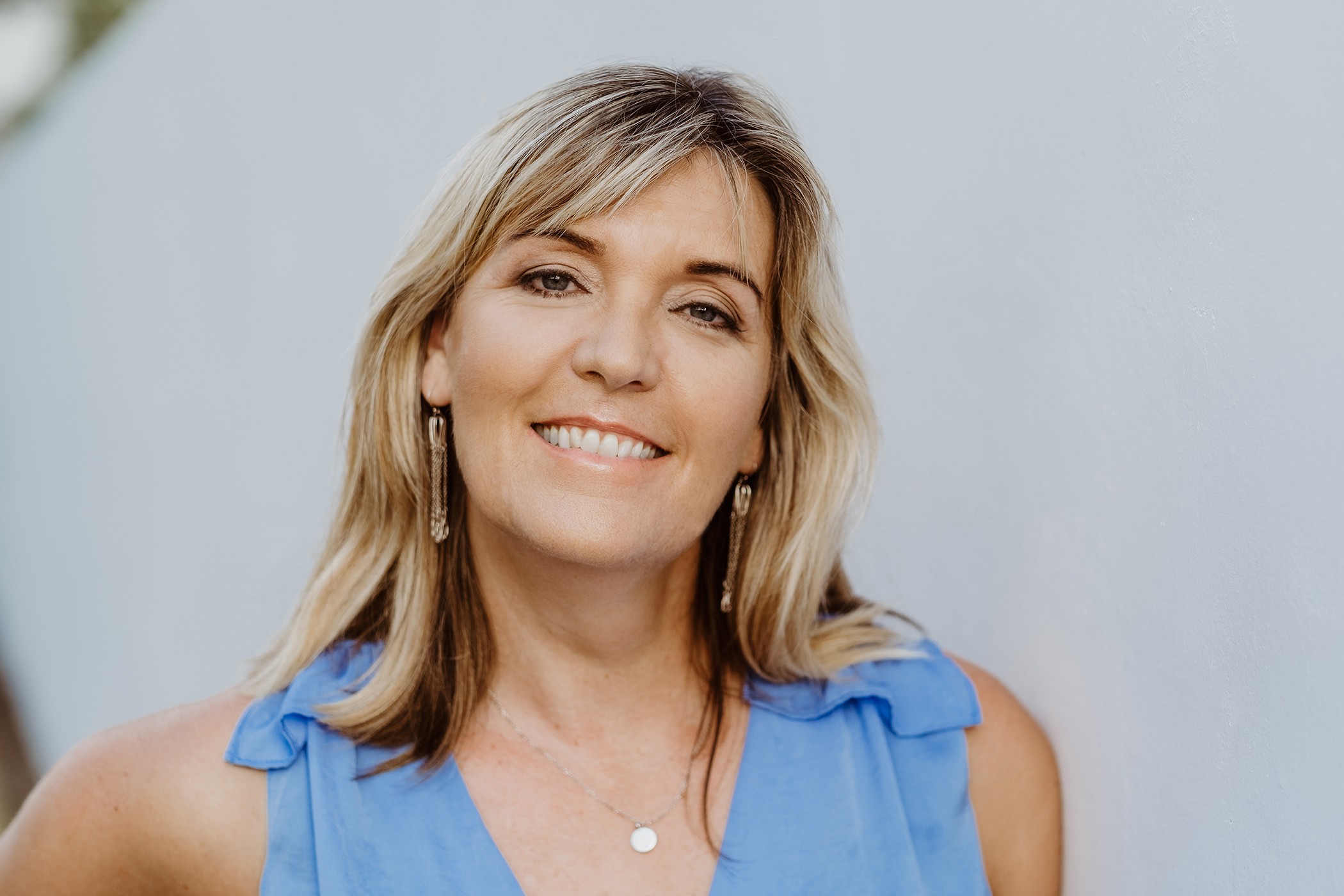

Today we’d like to introduce you to Sarah Symons.
Hi Sarah, so excited to have you on the platform. So before we get into questions about your work-life, maybe you can bring our readers up to speed on your story and how you got to where you are today?
I had a completely different career, as a composer of music for film and TV, when I learned about the human rights crisis of child sex trafficking and decided to devote the rest of my life to working on the issue.
In 2002, I was living in Cape Cod, MA with two small children, and writing and recording music for TV. A song I had written was used as the title song in a film that was premiering at Tribeca Film Festival in New York City. With great excitement, I went down to New York to see my song in the film. When I looked at the film listings and saw ‘The Day My God Died’ – a documentary about child sex trafficking between Nepal and India – I did not want to see it. I thought I already knew all about the issue. I was wrong! I thought the film would be sad and depressing, and I couldn’t do anything about it. Wrong again.
Although the film was deeply disturbing, it was anything but depressing. In fact, the film was incredibly inspiring, in that it profiled survivors who had turned the tables – they were active in a modern-day Underground Railroad. These survivors were taking rescue agencies and police back into the brothels to rescue other girls, or they were stopping every car at border stations between Nepal and India, and with the help of border police, stopping trafficking situations in progress. They were telling others, as part of large-scale public awareness campaigns in villages where girls were reported missing. This film showed people who were standing up against slavery, putting their lives on the line to fight it – with limited resources, with emotional and physical scars from years of abuse.
If they could do it, I had to find a way to support them. With all the resources we have in the US, surely there was something we could do to help break the chain of slavery. I later met my husband John for lunch that day and couldn’t wait to tell him. “I just saw a film that will change my life!” I should have said ‘our lives’ because, as it turned out, fighting slavery soon became a family business.
I started by contacting the organizations featured in the film and volunteering for them. A year later, I was invited to visit the Maiti Nepal rescue shelter in Kathmandu, Nepal. During this visit, I thought of selling the survivors’ handicrafts to help them gain economic independence. Many survivors had been living at the shelter for some years, and formal education was not an option for some because they were 16 years old or older and had never even gone to kindergarten. They were involved in an informal literacy program, which included therapeutic arts, such as beadwork and sewing.
While at the shelter, we brainstormed ways to help the girls become economically independent. It was difficult because they were so stigmatized by Nepali society as ‘bad girls’ and prostitutes. Some had HIV/AIDS, leading to further discrimination. During a shelter tour, we found a small room piled high with purses and beaded jewelry, which were being made as part of the informal education program.
Well, it was obvious what to do! I brought a few hundred dollars of samples home and showed them to all my friends and family. My husband came up with the idea of selling the products at home parties because this would also allow us to raise people’s awareness about human trafficking, an issue that was largely unknown at that time. One year after my first visit to Nepal, we imported our first shipment of products made by survivors from 4 shelters in Nepal, Thailand, and Cambodia.
We launched Her Future Coalition in 2005 using our life savings and the contributions of a few concerned friends. As the years passed, we added many other shelter, education, and economic independence programs for survivors. We built shelters and schools. We established a base of operations in Kolkata, India, and enlisted amazing local leaders as our staff. Today, we serve over 1500 women and girls yearly with long-term, intensive programs enabling them to become free and independent. We partner with some of the world’s best anti-trafficking shelters and prevention programs. We support and operate schools and other education programs and have job training programs in computers, metalsmithing, block and screen printing, Bakery and Cafe management, and many other fields. We have chosen to work in parts of the world where girls are most vulnerable and gender-based violence is the most severe.
Over the past 19 years, we have served over 7,000 women and children in India and Nepal, enabling them to heal from trauma and move forward – in many cases, to higher education and professional careers. We maintain a staff 12 in Kolkata, our headquarters, where we operate Kolkata’s first NGO co-working space. In the past two years, we have had the incredible joy and satisfaction of seeing one of our former beneficiaries, Anjali Tamang, launch her project – a school and anti-trafficking project in her village in Nepal. My proudest accomplishment is seeing girls like Anjali, whom we have supported, going on to help others and taking leadership in their communities. With many people’s help, vision, and commitment, my dreams for survivors are coming true.
It wasn’t obstacle-free, but would you say the journey has been fairly smooth so far?
It has been a beautiful and inspiring journey, but never a smooth road! We struggled to find funding for our work in the early days, and operating programs so far away brought many logistical challenges. We always sought to work in difficult, under-resourced environments because that was where the need was most extreme. At times, I struggled because of my people-pleasing tendencies and not being direct enough or speaking up soon enough when things weren’t working. Things blew up more than once because I failed to manage conflict. It is a continuing challenge to get people to care about girls halfway across the world and share the story in a sensitive, appropriate, and not sensationalized way. Funding the work is a daily challenge because so many girls rely on us.
Let’s switch gears a bit and talk business. What should we know?
Her Future Coalition (HFC) was founded in 2005 to break the cycle of exploitation, poverty, and violence against women and girls worldwide. We provide education, shelter, and job training to survivors of trafficking, child marriage, rape, and other forms of severe gender-based violence in India, Nepal, and Eastern Africa, as well as girls at high risk, such as those born into brothels. We focus on rebuilding lives and ensuring survivors are empowered with the tools they need to remain safe and independent and become leaders in their families and communities. We go strategically to places where women and girls are most vulnerable and work closely with trusted local partners to create effective solutions. HFC provides long-term and intensive support because that’s what it takes to get girls and young women out of situations where they are powerless and vulnerable. Through counseling, team-building, mental health support, and consistently showing up, we help them move from a place of trauma and hopelessness to a place of healing, resilience, and promise.
Developing the leadership and self-sufficiency of survivors is very important to us, and promoting young women who have gone through the program into leadership roles is integral to our success. We take a human rights-based approach and maintain an organizational culture of continuous learning, respect, and individual empowerment. Our core programs are:
- Economic Independence: Our vocational training and employment support services currently serve over 350 survivors and high-risk women annually, enabling them to get out of shelters, to live independently, to remain free and safe from exploitation, and to support their children. We train women in Computers, Bakery and Cafe Management, Block and Screen Printing, Hairdressing, Sewing, and many other fields according to their goals and dreams. We provide job placement, life skills, and financial literacy training as part of all our vocational courses.
- Shelter: HFC partners with local agencies to build, expand, and maintain shelters for rescued girls. We built an entire shelter in West Bengal. We expanded, or are currently expanding other shelters (in India, Thailand and Kenya), providing safe and dignified shelter to over a thousand girls. We also support maintenance, improvements, and room and board at these and other rescue shelters to ensure survivors have the time to heal and gain life skills before rejoining mainstream society. Our shelter program also includes three red light area Resource Centers, which keep 300 children safe while their mothers see clients.
- Education: We support the education of more than 1000 survivors and high-risk children each year. Our multi-year education programs include after-school learning centers in red light areas, support of entire schools in slums and high-risk villages, remedial education to help rescued survivors catch up with their peers, computer classes, and adult literacy and education sponsorships from grade school to grad school.
HFC partners with exemplary local organizations, and we are embedded in the communities in which we work. We maintain a staff 12 in Kolkata, India, which runs or oversees our India-based programming. We have supported, trained, and educated the most traumatized women for 19 years and have played an integral part in many incredible life transformations.
What does success mean to you?
I feel successful when a girl who has gone through our program can stand independently, building a free and meaningful life according to her values and interests. For some girls, that means going to med school. For others, it might mean working in a coffee shop, marrying a good guy, raising strong, healthy kids, ensuring their daughters are educated, and never having to experience the violence and exploitation they experienced. My proudest accomplishment has been walking alongside Anjali Tamang, a survivor trafficked from Nepal to India at age 11. She was rescued and went through our programs. Then, in 2021, with support from HFC, she opened a school in her village so that the next generation of girls would not have to experience the suffering she endured and to change the community’s mindset. This community has normalized trafficking and child marriage to the point that 75% of girls are either trafficked to India or forced into early marriage to avoid being trafficked. Through her school and anti-trafficking education in the village, Anjali is changing that story, and I feel proud to stand with her and support her every step of the way! Anjali and I co-wrote a book called Standing in the way, available on Amazon. My entire journey is chronicled in my book, This is no Ordinary Joy, available on Amazon.
Contact Info:
- Website: herfuturecoalition.
org - Instagram: https://www.
instagram.com/ herfuturecoalition/ - Facebook: https://www.
facebook.com/herfuture
- Email: [email protected]

Image Credits
Kate Gardiner Photography











